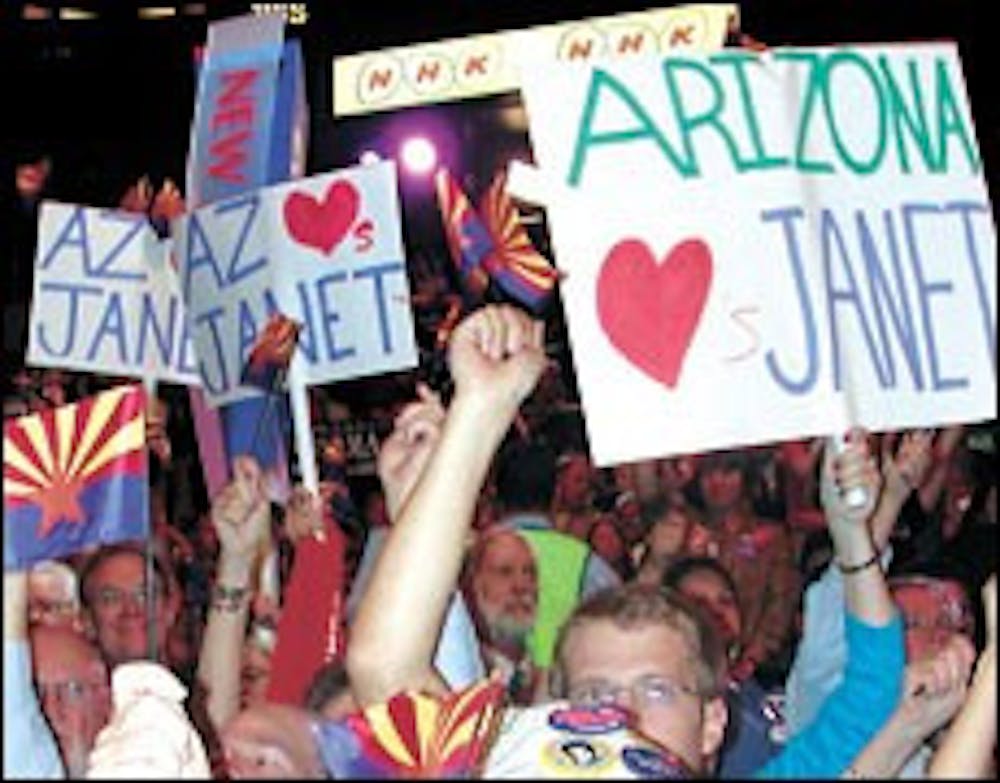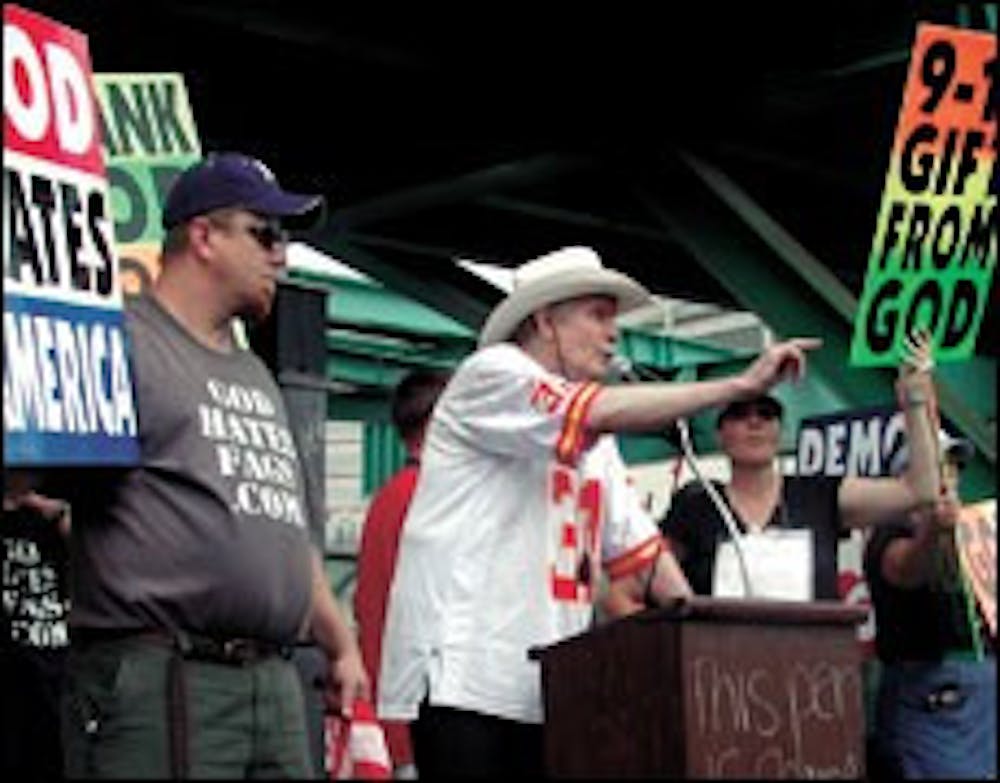BOSTON -- Democrats from across the nation converged in Boston to officially declare John Kerry as their 2004 presidential nominee and listened to the candidate's plan for "a stronger America" at the Democratic National Committee Convention last week.
Kerry and his supporters spent the week touting a unified vision for the country while criticizing many of President George W. Bush's policies and introducing Kerry and his vice presidential running mate John Edwards to the American public.
The vision outlined over the course of the week featured Kerry's intent to rebuild ties with allies to fight the war against terror and help bring security to Iraq by increasing the armed forces by 40,000 active troops.
Kerry pledged to fight a "smarter, more effective war on terror" that will integrate America's economic strength and principles into military operations and strengthen intelligence-gathering agencies based on recent Sept. 11 commission recommendations.
He also outlined his desire to make affordable health care widely available, roll back tax cuts for the wealthy and decrease dependence on Middle Eastern oil by relying on natural gas as well as "ingenuity and innovation."
This vision presents an optimistic view for the nation that can be achieved, Kerry added.
"There is nothing more pessimistic than saying America can't do better," he said. "America can do better, and help is on the way."
Battling for Arizona
In the coming months, Arizona residents should expect to see "a campaign like the state has never seen before," said Sarah Rosen, communications director for the Arizona Democratic Party.
Traditionally a Republican stronghold, this will be the first time Arizona is one of 21 battleground states, states that either party could win come November, Rosen said.
As a result, both parties will "fully target" Arizona voters with campaign strategies ranging from commercials to candidate visits.
"This is a different time for Arizonans," Rosen said.
The parties' focus on Arizona also meant the state received special recognition during the convention. Members of the Tohono O'odham Nation in Southern Arizona addressed the convention hall via live satellite feed multiple times Tuesday evening. Gov. Janet Napolitano and U.S. Reps. Raul Grijalva and Ed Pastor each spoke on the floor of the convention.
Additionally, Grijalva was one of only three speakers asked to officially nominate John Edwards as John Kerry's running mate.
Erik Trevino, an Arizona delegate, said he was glad to hear Arizona's leaders speak at the convention.
"It's a great representation of Arizona to the world," he said.
Arizona delegate Llewellyn Howell said Napolitano's role in Arizona politics made him confident that Kerry has a chance of winning the state in November.
"She won, so you know there is at least some majority that voted for her," Howell said. "I don't think anyone who voted for her will vote for Bush."
Arizona will also be targeted because of its Latino population, a group Republicans and Democrats alike have been working to attract.
"The Democratic party has no future in this country if we can't get the Latino vote," former Vermont Gov. Howard Dean explained Wednesday at a Hispanic Caucus meeting.
Harry Cisneros, former U.S. Housing and Urban Development Secretary, affirmed that the Latino vote will be especially crucial to winning Western battleground states like Arizona.
The Democratic platform reflects Latino concerns, including school funding and family values, more closely than Republican views, he said.
Cisneros also criticized the Bush administration's immigration policies, which allow foreign citizens to work in the United States for a limited amount of time before sending them home.
"Life intervenes when you come to this country to work," he said. "You will earn your right to be legal citizens."
Political youth
Of the 73 Arizona delegates and alternates to attend the Democratic convention, 13 were 35 years old or younger.
Trevino, an aerospace engineering junior at UA, was one of those young delegates. He decided to participate in the convention in order to "get energized" in preparation for an election that he is sure will have long-lasting effects.
"This election is going to affect our lives," Trevino said. "What happens in the next four years is going to impact our grandkids."
Trevino also hopes that his energy will help convince his peers back in Tucson to begin to pay attention to politics.
While many young people feel like politicians do not address their concerns, Trevino said youth cannot expect the government to respond to their desires when they do not bother to vote.
"We can't ask and ask and ask and turn the other way when they ask for our vote," he said.
It is important young voters break that cycle when so many of today's political policies directly impact 18- to 35-year-olds -- especially students' ability to pay off loans and the outlook of the job market, said Alexis Tameron, Young Democrats of America national committeewoman and an Arizona delegate.
"Every decision that's being made, given what's happening in the world now, is disproportionately affecting young people," she said.
Ohio delegate Sarah Bender agreed.
"These issues affect me. My generation is the future," she said.
As the youngest delegate at the convention, the 17-year-old Bender added she hoped to influence others to examine campaign issues.
"There are so many young people out there. Hopefully they will see us [young delegates] in the media and get inspired to become involved," Bender said.
No age group can simply count on its peers to represent it at the polls, said Jason Gangon, a Florida State University student. The Florida delegate said most people in his state learned that lesson during the 2000 presidential election.
"You never know when it's going to be your one vote that's important," he said.
At ASU, campus Democrats will play a huge role disseminating the Democrats' message to other students and registering their peers to vote, Rosen said.
"The youth vote is somewhat of a sleeping giant," she said. "If student voters were to go out and vote, they would have a significant influence."
Tameron, who is a 2002 ASU graduate, said such peer-to-peer discussion will be an important strategy in attracting students to the party.
"You want to hear [about politics] from someone who looks like you, who shares your values, who's at your point in life," Tameron said.
The next step
A Newsweek poll conducted after the convention and released Saturday showed Kerry leading Bush in polls 49 percent to 42 percent, with a margin of error of plus or minus 3 percentage points.
While the poll reflected a five point increase in Kerry's lead over Bush since before the Democratic National Convention, when the same poll showed Kerry winning the race 47 percent to 45 percent, Arizona Democratic Party Communications Director Sarah Rosen said the Democrats will not give their campaign efforts a rest any time soon.
Bush will likely jump in the polls after the Republican convention later this month, and the polls will continue to fluctuate until the election, Rosen explained.
Poll results will not dictate campaign strategies, as the Democrats will "stick to their game plan" up until Election Day, she said.
"It's not something we try to pay attention to. We'd go nuts," Rosen said. "This campaign is way too close to call."
Reach the reporter at amanda.keim@asu.edu.





